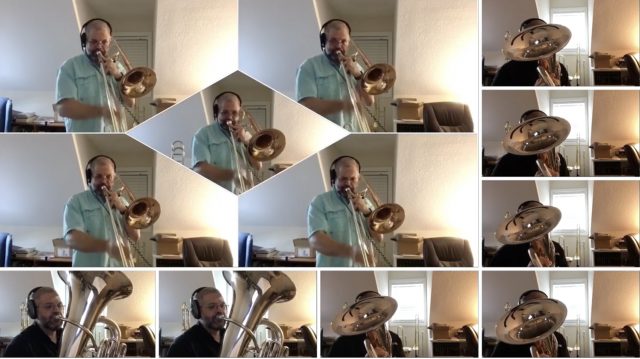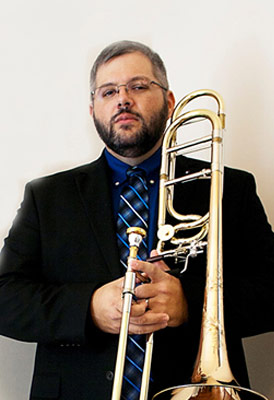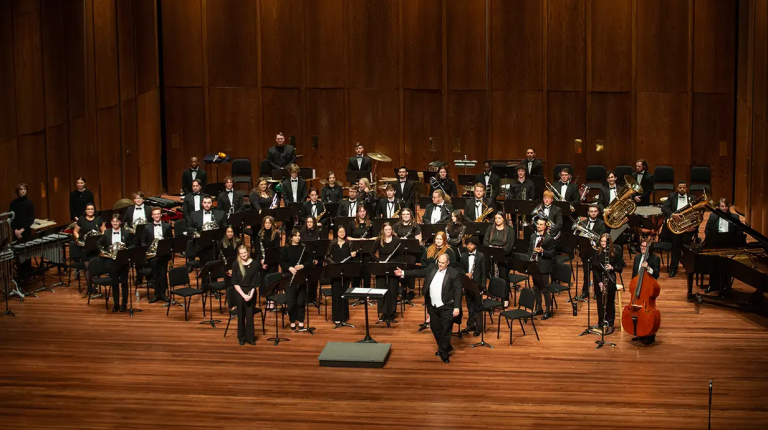
Dr. Micah Everett hones musical and technical skills with CoronaTunes series
As an Associate Professor of Music at UM and director of the Low Brass studio with a full teaching schedule that includes courses, lessons, ensembles, and his own performances, Dr. Micah Everett is used to staying busy – and while Covid-19 has changed a lot, it has not changed that.
“I resolved early on to spend part of the time away from my normal performance schedule making multitrack recordings to share on Facebook and YouTube,” he writes on his blog.

series has evolved as he
developed recording/editing skills
and acquired new technology.
The result is CoronaTunes, a video series of pieces for low brass instruments in which Everett plays each part. “My reasons for doing this were partly unselfish, but honestly, partly quite selfish,” he writes. “Unselfishly, I thought – as evidently many musicians and other artists did – that filling social media with music, dance, and other art forms would ‘take the edge off’ of a difficult time. Selfishly, I knew that I needed to continue to develop and refine my skills at making audio and video recordings.”
There are 30 tunes in the series, and the entire playlist is available on YouTube. “These are pieces that I like,” he says. “Around a third of them are my own arrangements, many of those published. A couple are tunes with my wife that she chose, and a couple of them are composer requests.”
Number 13 in the series, for example, is “Triskaidekaphile,” by Kenyon Wilson, who teaches at UT Chattanooga. “He not only asked that I play it, but he asked specifically that it be number 13 – for obvious reasons. It was tricky to record, because the rhythms stack up to 13s and each voice navigates different sequences of 13. Wilson made me a custom click-track to help me keep all the sequences straight.”
Other pieces were old hat for Everett, such as “Flight of the Bumblebee,” but even it presented interesting challenges. “I decided to do it one morning, arranged it that day, and recorded it that same day.”
“I’d performed it as a solo piece years ago,” he says. “It’s exhausting to play it as a solo piece, but much nicer to play in four parts – more manageable that way.”
Everett began teaching low brass at the college level in his mid-20s. Now that he’s in his 40s, he says, he sees a younger guard exploiting technology in exciting ways, playing with full effect racks, and putting out high-quality recordings. “I can see that there is some cool stuff happening and I need to figure it out before it passes me by.”
If you watch the CoronaTunes recordings through in order, says Everett, you’ll see that the quality of both the video and the audio get progressively better.
Everett started the CoronaTunes series working in the Acapella recording app, which he describes as intuitive. “It’s easy to jump in and start, but it’s limited in terms of its capacity.” Eventually, he saw he needed to work in a program with more capability, and ended up using Adobe Premiere Pro.
“As I became more proficient at mixing and editing, the results because increasingly satisfactory. I still have much to learn, but my skills in this area increased tremendously over this ten-week period away from my normal schedule, and I am glad to have been able to use the time so productively,” he writes.
What will he do with his new skills? Years ago, Everett recorded all the etudes required for the Mississippi Lions All-State Band to assist young musicians preparing for those auditions. “Since my ability to make a quality recording has improved so much, I think my next major project will be to rerecord those etudes.”
But Everett’s recording and editing skills are not the only thing that have improved in those intervening years: technology has also made a big leap. “My phone now has a better camera than the video camera I used to record the etudes those years ago. We play classical music that is hundreds of years old, but if you look at a video that’s even five years old, it seems ancient and dated.
As for the CoronaTunes series, Everett says he’s done . . . for now. “I was just trying to brighten everybody’s day during the quarantine, while getting better at some skills I’d wanted to improve. If you’d told me in March that I’d do 30, I might not have started – but I’m glad to have learned so much in the process,” he says.



